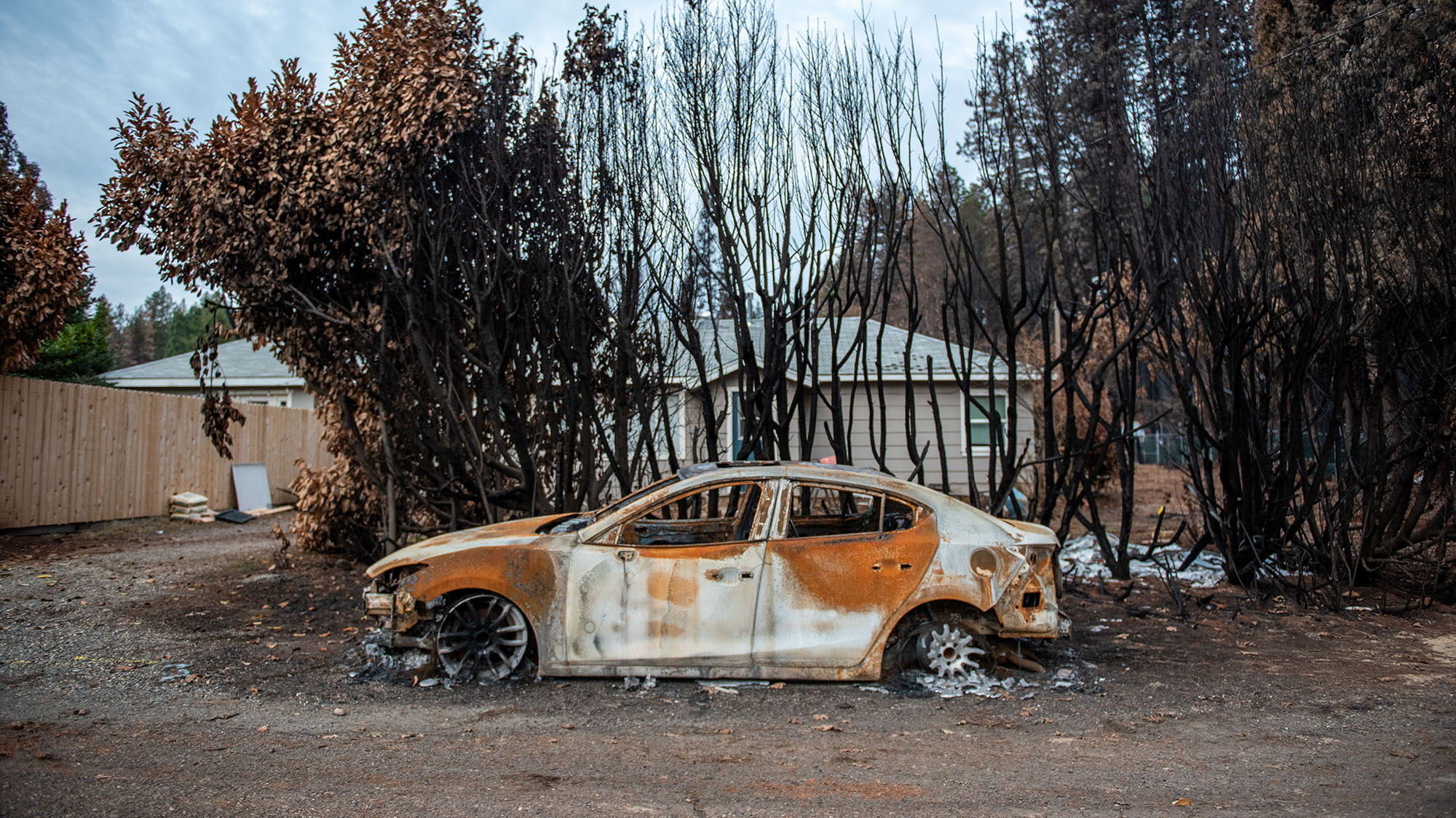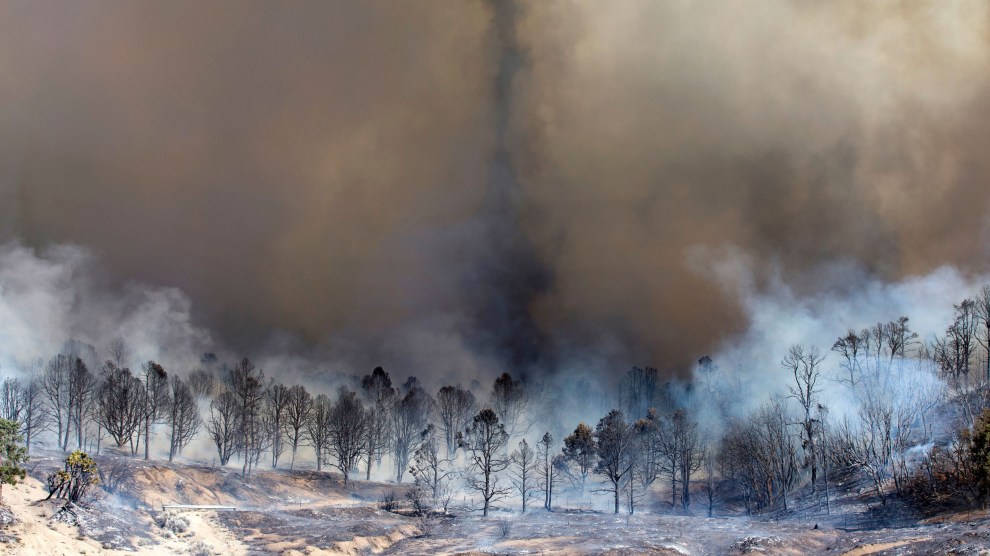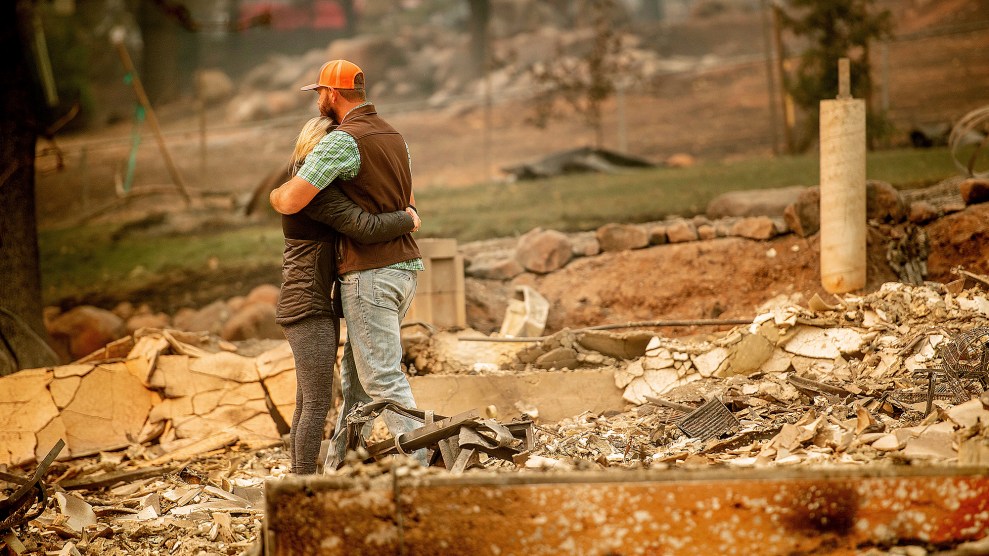On an overcast afternoon, Phil Hughes pulls his truck into the driveway of what was once his home in Paradise, California, and starts sifting through the rubble. He notes where his couch used to be, the bedroom where his 10-month-old son would sleep, the kitchen, all of it now reduced to soft gray ash that clings to his work boots as he digs for anything salvageable.
Since the day after Thanksgiving, the 27-year-old has been working on a crew cleaning up after the Camp Fire, the deadliest and most destructive wildfire in California history. He’s been spending long days hauling out the burned husks of other people’s homes. But this is the first time he’s seen his own. “I just haven’t been able to get away,” he says quietly. His neighborhood has been closed off. He’s not sure if he’s even supposed to be here, but today he told his boss he needed to leave early. “I kinda lied to him, and just came over here to see my house. To see what it was like.”
Moving slowly, Hughes stoops down and pulls out a few blackened, but still intact, ceramics. They clink against one another in his hands. “My wife had a huge piggy bank collection. She’s been all over the world, collected them,” he says. For a moment, he looks hopeful. Then he says, “People say to rebuild. But honestly, there’s nothing left of this town.”
The fire that leveled most of Paradise early on November 8 blazed across nearly seven miles in just 90 minutes. The first evacuation order came at around 7:30 a.m. Half an hour later, the fire attacked Paradise’s eastern fringes, flinging embers as far as a mile ahead of the main blaze. They landed in trees, on rooftops, in gutters, and flew into open windows; they torched yards and lit spot fires, some of which became 200-acre conflagrations within minutes. The fire spread at the rate of one football field every three seconds, becoming such a devastating “urban firestorm” that Cal Fire investigators likened it to Operation Gomorrah, an Allied bombing raid that ignited a firestorm that killed more than 42,000 civilians in Hamburg, Germany, in 1943.
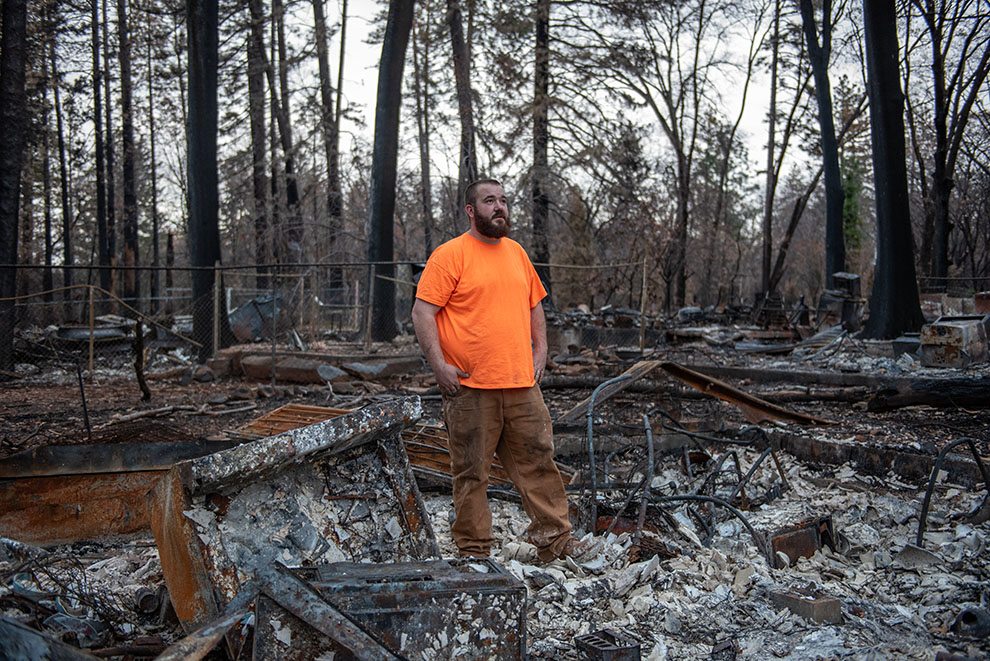
Phil Hughes, who was born and raised in Paradise, visits the ruins of his home for the first time since the Camp Fire.
Rosa Furneaux/Mother Jones
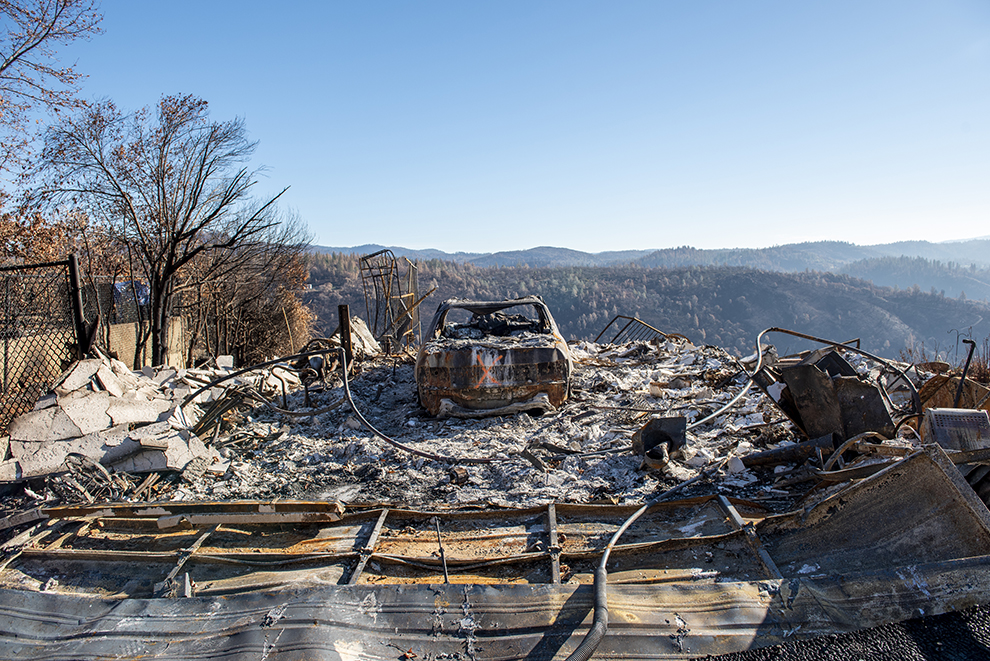
A burned-out car sits in the remains of a garage on the edge of Paradise.
Rosa Furneaux/Mother Jones
Perry Walters, a Paradise police officer who was on duty when the fire roared through town, says the town had a zone-by-zone evacuation plan, but it “all went to hell—because the whole town was on fire.”
When Hughes woke on the day of the fire, the flames were far away. Then, at 7:45 a.m., a friend who had been a wildland firefighter called. “Dude, get the hell out,” he told Hughes. “It’s taking out the whole town.” First he rushed to pick up his brother’s wife and two children, and then tried to return to rescue his dogs, but the fire was already roaring down his street. The smoke was so thick it turned the early morning sky midnight black. The home he and his wife bought a little more than a year before, just after their wedding, would soon go up in flames. (One of his dogs survived; the other is missing.)
Everyone has an escape story. Like Hughes, many spent hours trying to get out. Traffic bottlenecked. Telephone poles and fallen trees littered the three main roads leading out of Paradise. One driver drove off the road in a panic, attempting to escape through the cemetery only to be high-centered on a tombstone. Some abandoned their cars and fled on foot. People followed game trails through the forest; others sheltered in creeks as the fire passed over them. In the nearby town of Concow, some families jumped in a lake and swam to a small island, watching their homes burn on shore.
Estelle Mullins never got the evacuation alert. When she first saw flames, they were 100 feet away, burning the houses around her. She yelled to her two sons, 19 and 21, and her newborn granddaughter: “We have to go now!” They drove through fire. Through tears, she recalls how she saw a car full of people pull over; within seconds, it burst into flames. She had to keep telling her panicked son that they couldn’t help.
A month after the fire swept through Paradise and the surrounding Sierra Nevada foothills, taking 86 lives, consuming more than 150,000 acres, and destroying nearly 14,000 homes, there’s much talk of “repopulating” the town. But it’s clear that it will take years, not months, to rebuild Paradise—if it ever happens at all.
In a single day, Paradise experienced a mass exodus as nearly 27,000 people fled. Now they’re scattered—staying in shelters, crashing in homes of friends and family and strangers, living in their trucks or RVs. The cleanup and rebuilding effort is expected to cost billions of dollars and drag on for years. Many Paradise residents, who are seeking shelter and work wherever they can find them, can’t wait that long.
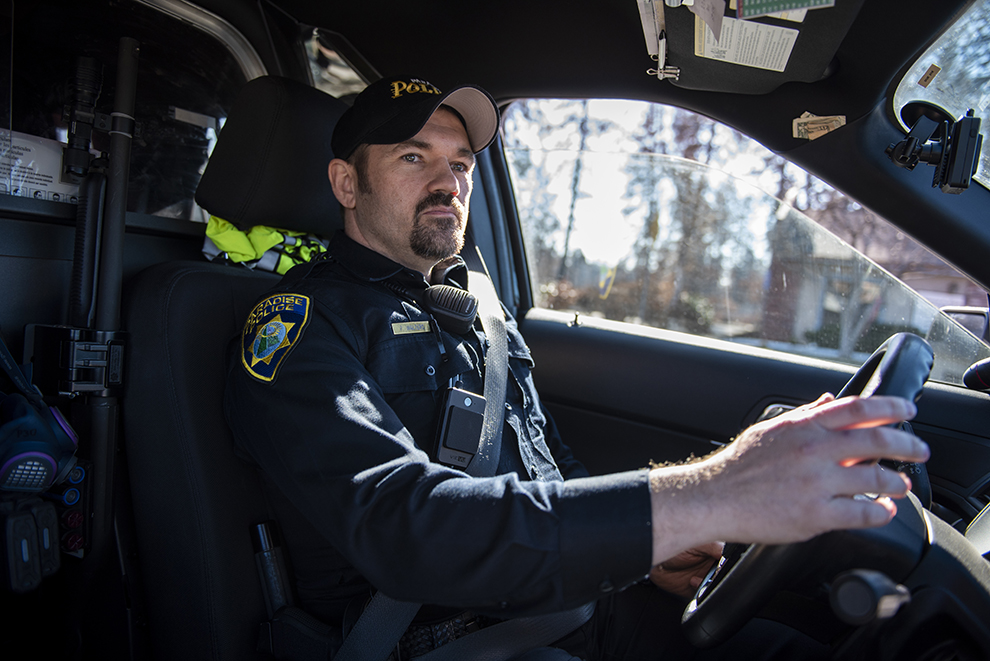
Police officer Perry Walters says he keeps getting lost because all of Paradise’s landmarks are gone.
Rosa Furneaux/Mother Jones
How long will it take to repopulate an entire town where half the schools were destroyed, where the main hospital is condemned, and where entire blocks are full of twisted metal and broken glass? Of the 3,000 homes lost in the Tubbs Fire in Santa Rosa, California, last October, only 60 have been reconstructed.
“What we saw as a result of the Camp Fire was one of the largest total destructions of a community,” says Brad Alexander of the California Office of Emergency Services, which is coordinating the recovery response. “I think we’re in some new territory with the Paradise fire. We’re talking about economic development and rehabilitation that’s going to take a long time. It’s going to require a lot of patience.”
While the United States is getting better at immediate responses to disasters, it’s “not very effective at organizing large-scale disaster recovery,” says Irwin Redlener, director of the National Center for Disaster Preparedness at Columbia University. It’s extremely complex—and costly. “Once the headlines go away and the broadcast journalists head off to other things, the towns and the localities are really left to fend for themselves.”
For weeks, traffic in Paradise consisted almost entirely of Pacific Gas and Electric trucks, cleanup crews, and police cars. Workers are restringing power poles, downing unstable trees, and removing toxic debris. Yet in much of Paradise, there is still no power or water. No businesses are open. Aside from a handful of standing basketball hoops, Paradise Elementary School is flattened. The high schoolers whose families have stayed nearby now attend class at the Chico Mall.
The California Highway Patrol stops vehicles at checkpoints near the entrance to Paradise. The officers give residents who are coming to visit their property a package with gloves, masks, and white hazmat suits.
Where mailboxes once stood, pink tags signify that a cadaver team has checked burned-out homes for remains. Bright orange Xs are spray painted on vehicles and propane tanks deemed to be safe. Cars that had burned on the streets left pockmarks in the asphalt so deep that they shake the vehicles passing over them.
As he patrols Paradise in his squad car, Walters says he keeps getting lost because all the landmarks are gone. Paradise, once a town so dense with trees its residents could barely see into their neighbors’ yards, now offers miles-long views—beautiful in their own way, but a constant reminder of what has been taken. “So far, from all the people I’ve talked to,” says Walters, “it seems like only about 1 out of every 10 are actually going to live on their property and rebuild. It seems a lot of people have already bought homes outside of town—probably about half.”
As Walters drives along, he encounters residents who have returned to little more than rubble and ash. Bent over and shuffling slowly, they may pull coffee mugs out of burned-out dishwashers—often the only items to survive—or decide to pile up what’s left of the copper wire and pipes to sell at a scrap yard.
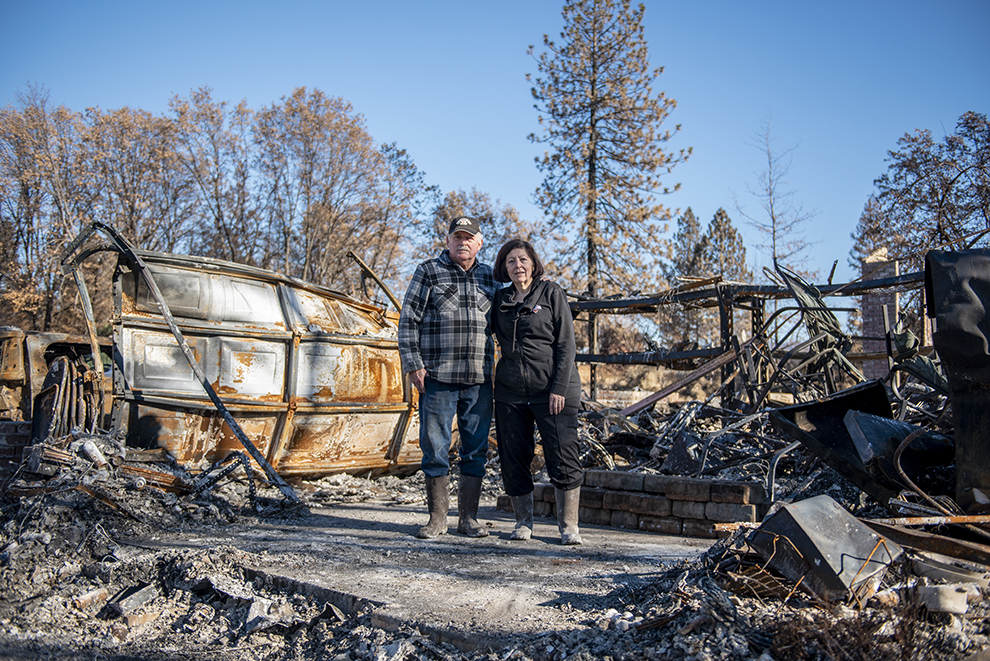
Becky and Mike Winkler stand in the remains of their home. “It was beautiful here,” Becky Winkler said. “You could see the stars at night.”
Rosa Furneaux/Mother Jones
Becky and Mike Winkler, both 66, are stacking bricks from what was supposed to be their retirement home. They barely considered rebuilding. “There’s nothing for us here,” she says. At a trailer park up the road, a woman named June gives a report on her neighbors. “Everybody I know is not coming back,” she says. “That house, she bought a condo in Redding; Ruth and Max, they’re looking for a place in Lodi; she’s in Chico now, Geraldine; Bill and Linda, they’re in Auburn…And I’m not coming back.” She wants to go somewhere on the coast, as far away from trees as she can get.
Five days after the fire began, the mayor of Paradise, Jody Jones, told Capital Public Radio that she doesn’t expect to be able to return for two years. “I have friends who are in their 80s, and the process is just too arduous to face and they’re not going to return,” she said. Jones recently purchased a house in Chico. Other residents say they have friends who have relocated throughout California, Washington, and Nevada, and as far away as Florida.
Hughes is aware of the challenges ahead. “We’re not just gonna clear land and rebuild. They’re not gonna let you live in a town that doesn’t have utilities,” he says. For a long moment, Hughes looks at his property in a daze. “I don’t know, man,” he says, shaking his head. “I don’t know.”
In the first few days after the fire, his family lived in his Chevrolet Tahoe outside a Walmart, then a house that eventually sheltered 14 survivors. A few days ago, he found a rental up in Red Bluff, an hour north. He might not have the patience that repopulating Paradise requires. It’s not a place to live anymore, and won’t be for a long time.
Nothing here looks familiar anymore, except one thing. Hughes notices a tree stump in his front yard. A couple of weeks before the fire, “Paradise said it was a fire hazard. They gave me 21 days to cut it down or else I was gonna be fined,” he says. “And I cut it down. And my frickin’ house burned down.”
With additional reporting by Rosa Furneaux.
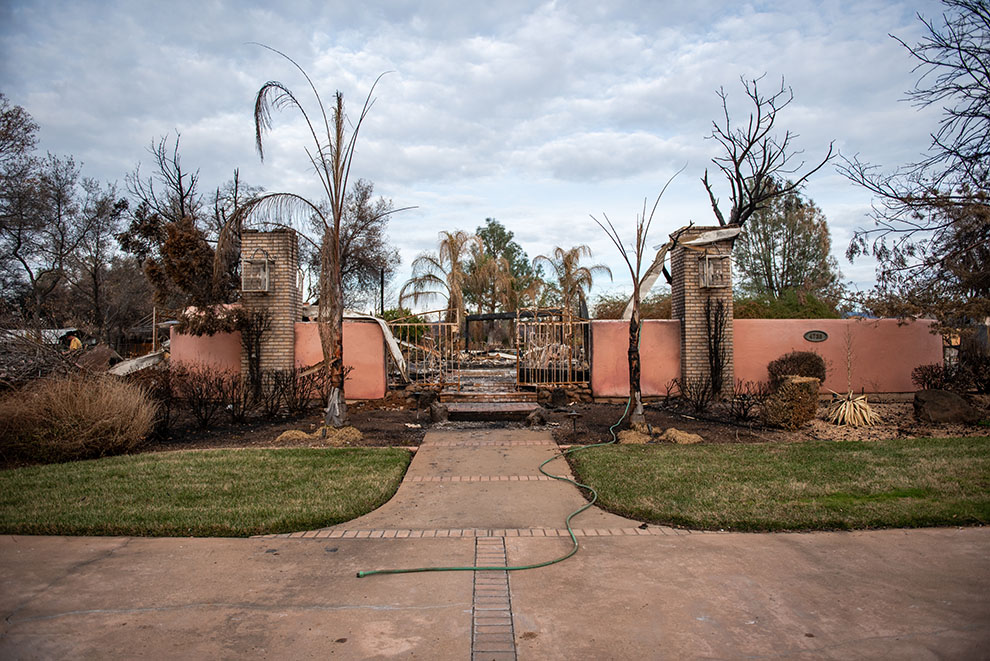
The owners of this property survived by standing on their front lawn as the fire swept through.
Rosa Furneaux/Mother Jones

